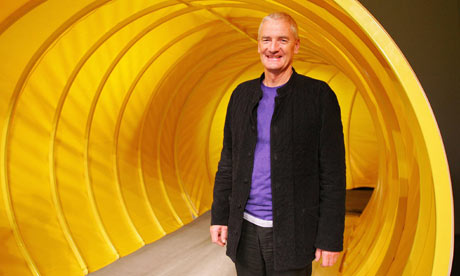
The UK needs shorter factory leases and looser employment laws if it is to thrive in manufacturing, the industrialist Sir James Dyson said.
Speaking in London, he told journalists that a key problem that remained for businesses looking to get into manufacturing was the challenge of having to sign long leases on property, and the overheads involved in hiring new staff. "Nobody wants the expenditure of a lease on a factory which lasts 21 years," he said. "You can't plan 21 years ahead."
His company of the same name, meanwhile, has its eyes on providing components for electric cars and batteries, using a new digital motor that it has developed. The Dyson engineers are also working on a robot vacuum cleaner – although "it's very hard to do" because of the problems of navigating around a room.
Dyson said he had seen too many occasions where unions did not act in everyone's interests. "I don't think trade unions have been helpful because they show things as divisive. As a modern employer you have to treat people well." In February Dyson, which employs 3,600 people worldwide, announced that it was looking to recruit another 300, of whom 200 will be in engineering roles. At least half the new roles will be taken up by graduates – what Dyson called "agile minds that are unsullied by other companies" – at salaries of up to £28,000, with a £3,000 joining bonus.
Dyson, famous for his vacuum cleaner range – for which he has fought a number of court battles over patents – also railed at the way many companies put themselves forward as akin to manufacturers: "I heard the head of British Airways on the radio the other day talking about his 'European product'. He doesn't have a product, he offers a service," said Dyson. "Insurance companies don't make anything. Architects don't make things. We aren't prepared to do the hard job of setting up technology companies in this country."
Dyson's company is one of the biggest in British manufacturing, with annual revenues heading towards £1bn annually as it emerges from a slowdown in sales in 2005/6. It is highly focused on engineering and design, having shifted manufacturing offshore to Malaysia – a highly controversial move – 10 years ago.
He declined to say what the company's next product will be. "When we have something, we'll launch it," he said.
Dyson has been a consistent champion of engineering and science, writing a report called Ingenious Britain for the Conservative party ahead of the 2010 election. He said he was pleased with the changes that the coalition has implemented by offering tax relief for startups and on research and development, and a reduction in capital gains tax on those selling from their companies. "[The government] gave us more than we asked for," he said. "I think the government is being bold and brave. But there's not a lot the government can really do. They can create the environment where it can all happen."
But he said that there are still anomalies in the tax regime – such as that which meant that the British designers of the new Raspberry Pi computer discovered it was cheaper to have it assembled in China than in Britain, because the unassembled individual components would each attract more import tax than the finished item.
"It's good that there has been an uptick of people studying physics in schools," he said, while criticising TV and media for failing to offer role models: "If you watch TV there's a lot about media and acting – which girls generally want to do," he commented. "But I'm encouraged by a statistic that says that 12% of girls want to be scientists. The trouble is, they want to be pathologists, because they've seen the CSI series."
Dyson denied that the company's washing machine range, first launched in 2000 but discontinued after what were seen as disappointing sales, had been a failure. "It was too cheap – we didn't make enough money from it," he insisted.
Dyson exports more than 80% of its products: the US is its largest market – where its upright vacuum cleaner is the best selling by value, according to US market researchers NPD – followed by Japan.

